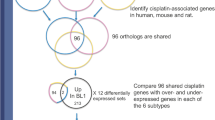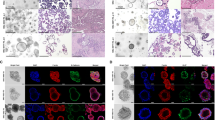Abstract
Prostate-specific membrane antigen (PSMA) is a protein frequently found to be overexpressed in various non-prostate cancer types. Our investigation, based on data from the TCGA databases, revealed a wide range of differential PSMA (encoded by FOLH1 gene) mRNA expressions across several cancer types, with notable findings in triple-negative breast carcinoma. This preclinical study delves into the molecular underpinnings of utilizing PSMA-targeting radiopharmaceuticals within specific breast cancer subtypes. We conducted a transcriptomic expression analysis of PSMA across different subtypes of breast cancer, focusing particularly on the triple-negative breast cancer (TNBC) subset. Our analysis encompassed 1100 patients from The Cancer Genome Atlas dataset. We observed a broad distribution of PSMA mRNA expressions across various subgroups within these cancer types. Notably, a subset of triple-negative breast cancer exhibited higher PSMA mRNA expression compared to non-triple-negative breast cancer. Intriguingly, we found that higher PSMA mRNA expression was associated with favorable outcomes in terms of distant metastasis-free and relapse-free survival in patients. Within a subset of TNBC patients, there is a prevalent overexpression of PSMA, which appears to be linked with improved relapse-free and distant metastasis-free survival. Our study succinctly highlights the significance of PSMA overexpression in TNBC and its potential impact on patient outcomes and provides a clear and concise overview of the study’s contributions to breast cancer research.




Similar content being viewed by others
Data Availability
The inclusion criteria for our study involved breast cancer patients from The Cancer Genome Atlas (TCGA) dataset. Specifically, we focused on individuals representing different subtypes of breast cancer, with a particular emphasis on the triple-negative breast cancer (TNBC) subset.
References
Alqahtani WS, Almufareh NA, Domiaty DM, Albasher G, Alduwish MA, Alkhalaf H, Almuzzaini B, Al-Marshidy SS, Alfraihi R, Elasbali AM et al (2020) Epidemiology of cancer in Saudi Arabia thru 2010–2019: a systematic review with constrained meta-analysis. AIMS Public Health 7:679–696
Astvatsaturyan K, Yue Y, Walts AE, Bose S (2018) Androgen receptor positive triple negative breast cancer: clinicopathologic, prognostic, and predictive features. PLoS ONE 13(6):e0197827
Bertagna F, Albano D, Cerudelli E et al (2020) Radiolabelled PSMA PET/CT in breast cancer. A systematic review. Nucl Med Rev Cent East Eur 23:32–35
Cancer Genome Atlas Research Network, Weinstein JN, Collisson EA et al. (2013) The Cancer Genome Atlas Pan-Cancer analysis project. Nat Genet 45:1113–1120
Dieci MV, Tsvetkova V, Griguolo G, Miglietta F, Mantiero M, Tasca G, Cumerlato E, Giorgi CA, Giarratano T, Faggioni G, Falci C (2019) Androgen receptor expression and association with distant disease-free survival in triple negative breast cancer: analysis of 263 patients treated with standard therapy for stage I-III disease. Front Oncol 9:452
Evans JC, Malhotra M, Cryan JF, O’Driscoll CM (2016) The therapeutic and diagnostic potential of the prostate specific membrane antigen/glutamate carboxypeptidase II (PSMA/GCPII) in cancer and neurological disease. Br J Pharmacol 173:3041–3079
Govindan S, Siraganahalli Eswaraiah M, Basavaraj C et al (2020) Androgen Receptor mRNA levels determine the prognosis in triple-negative breast cancer patients. BMC Cancer 20:745
Hasan TN, Shafi G, Syed NA, Alsaif MA, Alsaif AA, Alshatwi AA (2011) Lack of association of BRCA1 and BRCA2 variants with breast cancer in an ethnic population of Saudi Arabia, an emerging high-risk area. Asian Pac J Cancer Prev 14(10):5671–5674
Israeli RS, Powell CT, Corr JG, Fair WR, Heston WD (1994) Expression of the prostate-specific membrane antigen. Cancer Res 54:1807–1811
Kasoha M, Unger C, Solomayer E (2017) Prostate-specific membrane antigen (PSMA) expression in breast cancer and its metastases. Clin Exp Metastasis 34:479–490
Lauri C et al (2022) PSMA Expression in solid tumors beyond the prostate gland: ready for theranostic applications? J Clin Med 11(21):6590
Mariotto AB, Etzioni R, Hurlbert M, Penberthy L, Mayer M (2017) Estimation of the number of women living with metastatic breast cancer in the United States. Cancer Epidemiol Prev Biomark 26:809–815
Medina-Ornelas S, García-Perez F, Estrada-Lobato E, Ochoa-Carrillo F (2020) 68Ga-PSMA PET/CT in the evaluation of locally advanced and metastatic breast cancer, a single center experience. Am J Nucl Med Mol Imaging 10:135–142
Morgenroth A, Tinkir E, Vogg ATJ, Sankaranarayanan RA, Baazaoui F, Mottaghy FM (2019) Targeting of prostate-specific membrane antigen for radio-ligand therapy of triple-negative breast cancer. Breast Cancer Res 21:116
Parker JS, Mullins M, Cheang MCU et al (2009) Supervised risk predictor of breast cancer based on intrinsic subtypes. J Clin Oncol 27:1160–1167
Roberts MJ, Maurer T, Perera M et al (2023) Using PSMA imaging for prognostication in localized and advanced prostate cancer. Nat Rev Urol. 20:23–47
Sartor O, de Bono J, Chi KN et al (2021) Lutetium-177-PSMA-617 for Metastatic castration-resistant prostate cancer. N Engl J Med 385:1091–1103
Sathekge M, Lengana T, Modiselle M et al (2017) 68Ga-PSMA-HBED-CC PET imaging in breast carcinoma patients. Eur J Nucl Med Mol Imaging 44:689–694
Siva S, Udovicich C, Tran B, Zargar H, Murphy DG, Hofman MS (2020) Expanding the role of small-molecule PSMA ligands beyond PET staging of prostate cancer. Nat Rev Urol 17:107–118
Tolkach Y, Gevensleben H, Bundschuh R et al (2018) Prostate-specific membrane antigen in breast cancer: a comprehensive evaluation of expression and a case report of radionuclide therapy. Breast Cancer Res Treat 169:447–455
Uijen MJM, Derks YHW, Merkx RIJ et al (2021) PSMA radioligand therapy for solid tumors other than prostate cancer:background, opportunities, challenges, and first clinical reports. Eur J Nucl Med Mol Imaging 48:4350–4368
Wernicke AG, Varma S, Greenwood EA, Christos PJ, Chao KC, Liu H, Bander NH, Shin SJ (2014) Prostate-specific membrane antigen expression in tumor-associated vasculature of breast cancers. Apmis 122(6):482–489
Acknowledgements
The authors extend their appreciation to the Deputyship for Research & Innovation, "Ministry of Education" in Saudi Arabia for funding this research (IFKSUOR3-370-1).
Author information
Authors and Affiliations
Corresponding author
Ethics declarations
Competition of interest
None.
Additional information
Communicated by: Ewa Ziętkiewicz
Publisher's Note
Springer Nature remains neutral with regard to jurisdictional claims in published maps and institutional affiliations.
Rights and permissions
Springer Nature or its licensor (e.g. a society or other partner) holds exclusive rights to this article under a publishing agreement with the author(s) or other rightsholder(s); author self-archiving of the accepted manuscript version of this article is solely governed by the terms of such publishing agreement and applicable law.
About this article
Cite this article
Shahid, M., Alaofi, A.L., Alqahtani, M.S. et al. Genetic implications of PSMA expression variability in breast cancer subtypes with a focus on triple-negative breast cancer. J Appl Genetics (2023). https://doi.org/10.1007/s13353-023-00814-3
Received:
Revised:
Accepted:
Published:
DOI: https://doi.org/10.1007/s13353-023-00814-3




